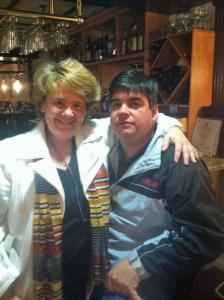Judy Keding

Sector Management in New England
This project documents fishery management related changes in individuals, households, and communities in New England.
Samantha Sperry
Judy Keding, 49, is the wife of commercial fisherman Jim Keding, out of Plymouth, Massachusetts. Mrs. Keding does not come from a fishing background; her husband has been fishing since he was 17, before they met. Mr. Keding currently captains a dragger that he does not own, generally targeting inshore codfish. He has been a member of sector 10 since sector management began though he has had to sell his two vessels and leases his low quota; Mrs. Keding works as a substitute teacher to supplement income. Mrs. Keding feels that sector management is not the best option for fishermen, that it often excludes small, family businesses, in favor of large businesses with greater capital. Her quality of life, income and personal relationship with her husband have all been negatively affected by sector management and the stress associated with sectors.
Please Note: The oral histories in this collection are protected by copyright and have been created for educational, research and personal use as described by the Fair Use Doctrine in the U.S. Copyright law. Please reach out Voices@noaa.gov to let us know how these interviews are being used in your research, project, exhibit, etc. The Voices staff can help provide other useful resources related to your inquiry.
The NOAA mission is to understand and predict changes in climate, weather, oceans, and coasts, to share that knowledge and information with others, and to conserve and manage coastal and marine ecosystems and resources. The Voices Oral History Archives offers public access to a wide range of accounts, including historical materials that are products of their particular times, and may contain offensive language or negative stereotypes.
Voices Oral History Archives does not verify the accuracy of materials submitted to us. The opinions expressed in the interviews are those of the interviewee only. The interviews here have been made available to the public only after the interviewer has confirmed that they have obtained consent.
